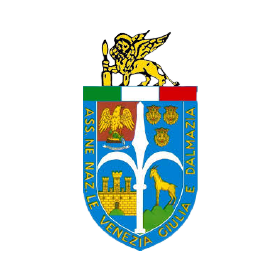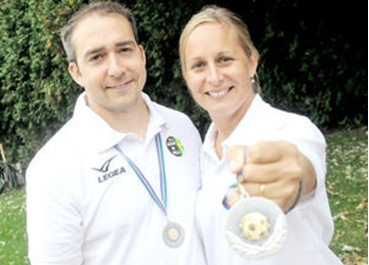By MARK MALONE, The Daily News
Cristina and Dan Perini had sung La Mula de Parenzo dozens of times before.
This day was different, though.
The Chatham siblings were in a tunnel at Stadio Flaminio in Rome, waiting to take the field for the biggest soccer games of their lives.
Their team, Grion Pola, began singing the folk song.
Soon, so did the two other teams at the Triangolare del Ricordo, or Triangle of Remembrance, tournament.
Then hundreds of fans began singing along.
Cristina and Dan started crying.
“I haven’t been that emotional in a long time,” said Dan, 36.
The tournament brought together players whose ancestors lived in the Istria region of northeastern Italy before it was given to Yugoslavia at the end of the Second World War.
Citizens who didn’t want to live under a communist regime were forced to flee across the border back into Italy, leaving behind many of their belongings and losing their citizenship.
Over the years, they scattered around the globe in search of a better life.
They kept alive their heritage any way they could. For example, by teaching songs such as La Mula de Parenzo (The Woman from Parenzo) to their children and grandchildren.
That’s how the Perinis — and their teammates from Italy, Australia, South Africa, Argentina, Switzerland and the U.S. — knew the tune.
“That’s one thing that unified people: the songs,” said Cristina, 38. “It didn’t matter what team you were on, you knew the songs.”
The round-robin tournament Sept. 21 featured three teams — Fiumana and Dalmazia were the others — representing clubs that disbanded 70 years ago.
Spectators came from across Italy.
Some players were ex-professionals. Others, like Dan and Cristina, played in university.
The stadium is home to Italy’s national rugby team. The field was as well-manicured as the greens at Augusta.
Dan was nervous. His coach told him not to worry.
“By being here, you’ve already won,” he said. “You’re representing your parents and all the sacrifices that they made. All you have to do is go out on the field.”
Dan and Cristina’s father, Antonio, hails from the town of Capodistria. Their mother, Silva, is from Castelvenere.
They were part of the Istrian exodus from what now belongs to Croatia and Slovenia.
“They were literally running away from communists, away from the border in the middle of the night with nothing so they would not be beaten or tortured,” Cristina said.
As many as 350,000 people settled in refugee camps near the city of Trieste, which was the home of a concentration camp and crematorium during the war.
The refugee camps lasted long after the war.
Silva finally left with her family in 1957 and moved to Dresden. Antonio came with his family to Chatham in 1961.
Because their hometowns were no longer part of Italy, they weren’t considered Italians.
It took decades for Antonio to have Italian citizenship again. Silva still doesn’t.
Cristina’s husband, Cristiano, was born and raised in Trieste, but he was never taught about the Istrian exodus.
“The people in Italy have never heard 350,000 were forced out of Italy and never recognized as Italian,” said Cristina, a teacher at H.W. Burgess Public School in Wallaceburg.
The country was ashamed after losing the war, Dan said, but the truth has begun to emerge over the past decade.
“Now they’re starting to do these cultural exchanges,” he said. “The soccer games were one way to show unity around the world.”
Cristina heard about the tournament on Facebook. High-level players were welcome to apply.
Both Perinis played at the University of Windsor. Dan later played at the National College of Chiropractic in Chicago, while Cristina played at De Montfort University in England.
Teams stayed at Rocca di Papa near the summer home of the pope.
They practised separately for a few days before the tournament, but they ate together.
Each team had a professional coach and a trainer. They held sessions on the field and in the classroom.
“It was like you were playing on Chelsea,” said Cristina, who worked with several Premier League teams while completing her master’s degree in England.
“It was the closest to being professional without us ever being professional,” Dan said.
Cristina, the only woman at the tournament, was her team’s captain. When she wasn’t playing, Dan was the captain.
They won silver medals as their team went 1-1.
Cristina also received a special achievement award. Other winners included driving legend Mario Andretti, Olympic boxing champion Nino Benvenuti and Olympic fencing champion Margherita Granbassi.
“It didn’t matter who won,” Cristina said. “We were all there to enjoy our time, to make friends with everyone, to share our stories.”
Added Dan: “It was like our coach said, ‘It doesn’t matter if you win or lose. By being here, we’ve already won. Because our stories are being passed down to the next generation.'”
After sharing a room for three days, two players — one from Trieste and one from Argentina — learned they were cousins when their families came to visit.
“It’s crazy what a small world this is,” said Dan, a chiropractor.
Following the tournament, fans and relatives joined the players for a meal at their compound. They talked into the wee hours of the morning.
Old men cried as they shared their stories about the war and the years after.
They urged players not to let it happen again. They warned against holding grudges. They told players to be proud of their Italian heritage.




